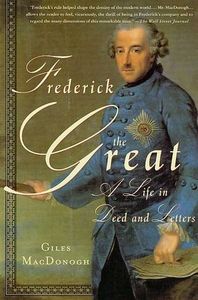The actual written poetry of Frederick the Great, for instance, was not even German or barbaric, but simply feeble–and French. ck chesterton
"A man who gives battle as readily as he writes an opera; who takes advantage of all the hours that other kings waste following a dog chasing after a stag; he has written more books than any of his contemporary princes has sired bastards; and he has won more victories than he has written books."-VOLTAIRE on Frederick the Great
Free thinker, misanthrope, poet, philosopher, lawmaker, and soldier, Frederick the Great was a contradictory, almost unfathomable, man. His conquests made him one of the most formidable and feared leaders of his era. But the king's other-often ignored-accomplishments rank him among the ablest statesmen in modern European history. A patron of artists and intellectuals, Frederick re-created Berlin as one of the continent's great capital cities, reformed Prussia's legal system, and strove to match his state's reputation for military ferocity with one for cultural achievement. Though history remembers Frederick as a "Potsdam Fhrer," his father, King Frederick William, the true architect of Prussian militarism, more rightly earned the title. When, as a youth, Frederick attempted to flee the elder man's brutality and anti-intellectualism, his father had him imprisoned and tried, then forced him to watch the execution of his friend and co-conspirator, Katte. Though a subsequent compromise between king and prince allowed Frederick to take the throne in 1740, he would remain true unto himself: his tastes for music, poetry, and architecture would match the significance of his military triumphs in the Seven Years' War. Drawing on the most recent scholarship, Giles MacDonogh's fresh, authoritative biography gives us the most fully rounded portrait yet of an often misunderstood king.
